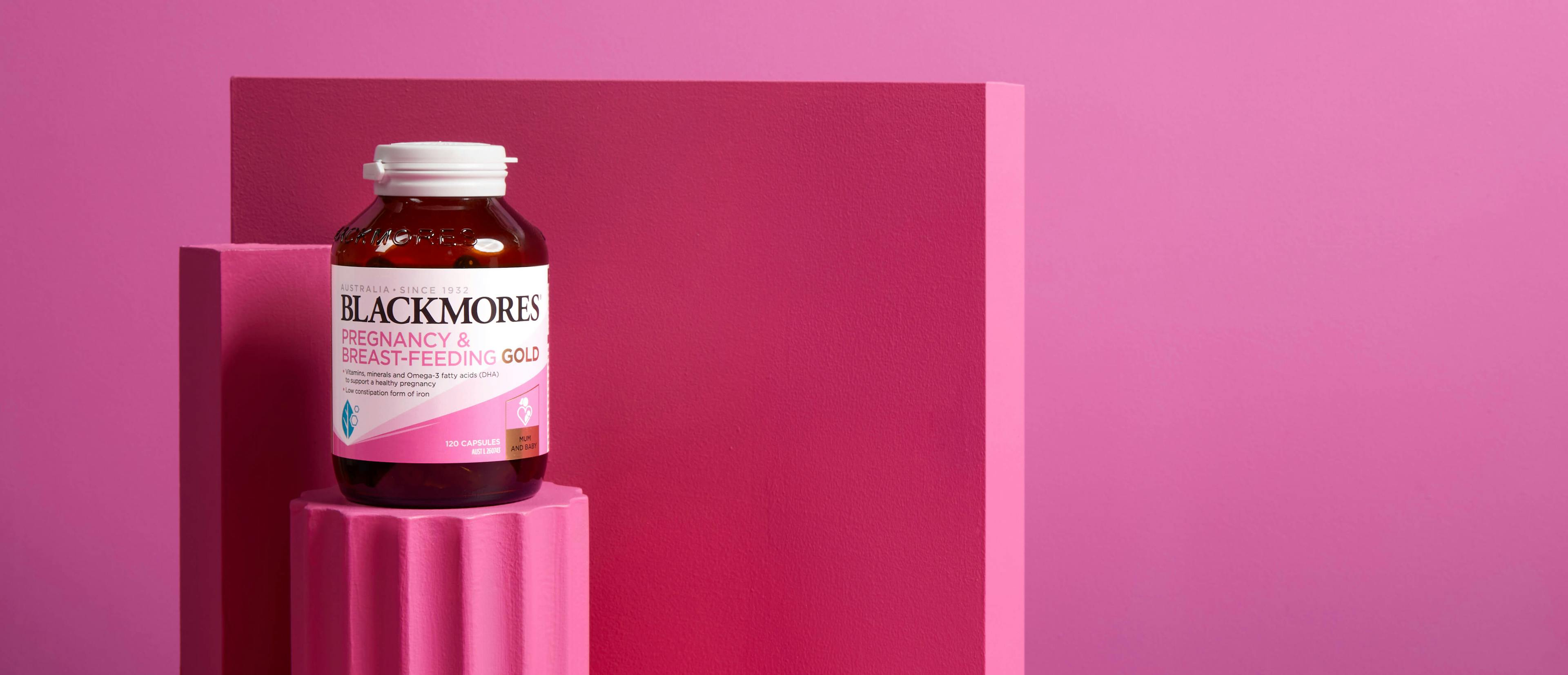- Shop All Blackmores Vitamins & Supplements/
- Blackmores Pregnancy & Breast-Feeding Gold

Blackmores Pregnancy & Breast-Feeding Gold
Formulated to support a healthy pregnancy for mum and bub. Contains 20 important nutrients including folic acid, iron, DHA and vitamin D.
Always read the label and follow the directions for use. Read the warnings below before purchase.
$37.99
Overview
Blackmores Pregnancy & Breast-Feeding Gold provides an ideal dose of 20 important nutrients for mother including folic acid, iodine and vitamin D3, with supporting nutrients for baby.
With omega-3 DHA to support baby’s brain and nervous system development, it also contains a lower constipation iron which is gentle on the digestive system.
With omega-3 DHA to support baby’s brain and nervous system development, it also contains a lower constipation iron which is gentle on the digestive system.
Why use
Blackmores Pregnancy & Breast-Feeding Gold provides 20 important nutrients in total including a daily dose of:
- 500 microgram of folic acid which, if taken daily for one month before conception and during pregnancy, may reduce the risk of having a child with spina bifida/neural tube defects
- 150 microgram of iodine to help support baby's brain development
- Lower constipation iron
- Odourless and concentrated fish oil, rich in DHA for baby's brain and nervous system development
The Blackmores difference
All nutrients are important during pregnancy and breastfeeding. The following provides additional information on some special nutrients important during pregnancy and breastfeeding, that are in Pregnancy & Breastfeeding Gold.
Folic acid – According to guidelines in Australia* this product contains 500 micrograms of folic acid, as it is recommended that women of childbearing age take 400-500 μg of folic acid per day for at least one month before pregnancy and for the first 3 months of pregnancy.
*Guidelines for preventive activities in general practice, 8th edn. East Melbourne: Royal Australian College of General Practitioners, 2012.
Iodine - Requirement for iodine is increased during the whole pregnancy, especially the first 20 weeks.
Australian women are typically not receiving enough iodine. The National Health and Medical Research Council (NHMRC) recommends that pregnant and breast-feeding women take an iodine supplement containing 150 microgram* daily.
*NHMRC Public Statement: Iodine supplementation for pregnant and breastfeeding women. NHMRC, 2010.
Iron - Approximately one quarter of pregnant women report getting constipated when taking high doses of supplemental iron. That is why Pregnancy & Breastfeeding Gold contains a low-constipation, low-nausea, gentle on the tummy form of iron.
Omega-3 fatty acids - During pregnancy there can be an increased sensitivity to tastes, especially in the first trimester. Odourless fish oil means pregnant women can get the benefits of omega-3s without the fishy aftertaste.
Vitamin D - Vitamin D supports healthy foetal development. A review of nutrient intakes in pregnant Australian women suggested that dietary intakes were below recommended levels for vitamin D, while surveys of Australian neonates have shown approximately 40-57% of neonates have insufficient vitamin D levels
B group vitamins - Vitamins B2 and B12 support a healthy pregnancy by helping the body to use folic acid.
Visit the Blackmores Health hub for articles, advice and tips for wellbeing during pregnancy & preconception
Folic acid – According to guidelines in Australia* this product contains 500 micrograms of folic acid, as it is recommended that women of childbearing age take 400-500 μg of folic acid per day for at least one month before pregnancy and for the first 3 months of pregnancy.
*Guidelines for preventive activities in general practice, 8th edn. East Melbourne: Royal Australian College of General Practitioners, 2012.
Iodine - Requirement for iodine is increased during the whole pregnancy, especially the first 20 weeks.
Australian women are typically not receiving enough iodine. The National Health and Medical Research Council (NHMRC) recommends that pregnant and breast-feeding women take an iodine supplement containing 150 microgram* daily.
*NHMRC Public Statement: Iodine supplementation for pregnant and breastfeeding women. NHMRC, 2010.
Iron - Approximately one quarter of pregnant women report getting constipated when taking high doses of supplemental iron. That is why Pregnancy & Breastfeeding Gold contains a low-constipation, low-nausea, gentle on the tummy form of iron.
Omega-3 fatty acids - During pregnancy there can be an increased sensitivity to tastes, especially in the first trimester. Odourless fish oil means pregnant women can get the benefits of omega-3s without the fishy aftertaste.
Vitamin D - Vitamin D supports healthy foetal development. A review of nutrient intakes in pregnant Australian women suggested that dietary intakes were below recommended levels for vitamin D, while surveys of Australian neonates have shown approximately 40-57% of neonates have insufficient vitamin D levels
B group vitamins - Vitamins B2 and B12 support a healthy pregnancy by helping the body to use folic acid.
Visit the Blackmores Health hub for articles, advice and tips for wellbeing during pregnancy & preconception
Active ingredients per capsule
containing omega-3 marine triglycerides 150 mg as:
Docosahexaenoic acid (DHA) 125 mg
Eicosapentaenoic acid (EPA) 25 mg
Also called niacin; nicotinamide (vitamin B3) is a water-soluble nutrient involved in energy production and carbohydrate metabolism.
Legumes, peanuts, wheat bran, and fish are all sources of vitamin B3.
Ascorbic acid (vitamin C) is a water-soluble antioxidant nutrient involved in many biological processes in the body. Vitamin C is found in a number of fruits and vegetables, great sources are capsicums, blackcurrants, oranges and strawberries.
Calcium is the most abundant mineral in the body and is primarily stored in the bones.
Calcium containing foods include dairy products, fortified soy products, broccoli, bok choy, fish with bones- such as salmon and sardines.
Biotin is a water-soluble nutrient belonging to the B group vitamins. Food sources of biotin include cheese, cauliflower and eggs.
Iron is an essential mineral and an important component of proteins, such as haemoglobin, involved in oxygen transport and metabolism.
Iron containing foods include lean red meat, poultry, fish, oysters, dried fruit, legumes, beetroot, whole grains and tofu.
Zinc is an essential trace element that plays a role in every living cell in the body. There are also around 300 enzymes that need zinc for healthy function. Zinc containing foods include meat, eggs, seafood- especially oysters, whole grains and seeds.
Magnesium is an essential nutrient that plays a role in over 300 enzymatic reactions in the body and plays a role in a large number of biological processes.
Magnesium containing foods include green leafy vegetables, nuts, cocoa and whole grains.
Selenium is a trace element that acts a cofactor of antioxidant enzymes.
Selenium makes it's way into the food chain through incorporation into plants from soil, leading to a variation in the amount of selenium in human adults around the world depending on the selenium content of the soils and crops in different locations.
Selenium food sources include brewer's yeast, wheat germ, fish, seafood, Brazil nuts and garlic.
Chromium is an essential trace mineral needed for carbohydrate, lipid and protein metabolism.
Chromium is found in brewer's yeast, wholegrain breads and cereals, cheese, eggs, bananas, spinach and mushrooms.
Thiamine (vitamin B1) is a water-soluble nutrient required for converting carbohydrates into energy.
Food sources include whole grains, beans, nuts, sunflower seeds, pork and beef.
Riboflavin (vitamijn B2) is a water-soluble vitamin involved in ATP production and the metabolism of many of the other B group vitamins. Food sources include almonds, mushrooms and wild rice.
Vitamin B2 supplements may change urine colour to bright yellow.This is harmless and temporary.
Pantothenic acid (vitamin B5) is involved in the metabolism of fats and carbohydrates for energy production.
Vitamin B5 is found in sunflower seeds, peas, beans (except green beans), poultry and whole grains.
Pyridoxine hydrochloride (vitamin B6) is a water-soluble nutrient involved in the production of proteins, neurotransmitters and haemoglobin. Whole grains, legumes, bananas, seeds, nuts and potatoes are good sources of vitamin B6.
Cyanocobalamin (vitamin B12) is an essential water-soluble nutrient needed for protein and DNA synthesis, folate metabolism, and red blood cell production.
Food sources of vitamin B12 include egg yolk, fish, beef, milk and cheese.
Colecalciferol (vitamin D) is a fat-soluble nutrient that is manufactured in the skin through the action of sunlight. Vitamin D regulates calcium and phosphate metabolism which is important in the maintenance of bone health.
A water-soluble B group vitamin, folate is involved in the synthesis of DNA and RNA and the activation of vitamin B12 into it's active form.
Folic acid is found in fresh green leafy vegetables, broccoli, mushrooms, legumes, nuts and fortified cereals.
Vitamin E is a fat-soluble nutrient that exists in 8 different isomers (forms) of vitamin E alpha-, beta-, gamma-, and delta-tocopherol; and alpha-, beta-, gamma-, and delta-tocotrienol. It's main action is as an antioxidant which is responsible for many of it's functions in the body. Vitamin E is found in cold-pressed vegetable oils, nuts and seeds.
Iodine is an essential trace element and is an integral part of the thyroid hormone, thyroxine, required for normal growth and metabolism.
An adequate intake of iodine is particularly important for pregnant and breastfeeding women when infants are entirely dependent on their mother's intake of iodine for normal growth and brain development.
Foods containing iodine include seawater fish, shellfish, seaweeds and iodised salt.
Betacarotene is a fat soluble antioxidant found in fruits and vegetables- particularly carrots.
Also called provitamin A, betacarotene is converted into vitamin A in the body.
Dosage
Adults – Take 2 capsules, once a day, or as professionally prescribed. Take with food.
Warnings
- Always talk to your health professional before taking multiple products for pregnancy.
- Follow the directions for use.
- Vitamin supplements should not replace a balanced diet.
- Drink plenty of water. Advise your doctor of any medicine you take during pregnancy, particularly in your first trimester. If you are concerned about the health of yourself or your baby, talk to your health practitioner.
- Contains fish, sulfites and soya bean products.
- Do not exceed the stated dose except on medical advice. If you have had a baby with a neural tube defect / spina bifida, seek medical advice.
- This product contains selenium which is toxic in high doses. A daily dose of 150 microgram for adults of selenium from dietary supplements should not be exceeded.
- If you have any pre-existing conditions, or are on any medications always talk to your health professional before use.
- Some products should be ceased at least two weeks before any elective surgery, please confirm with your health professional.
Physical description
Oblong, opaque brown capsule
Caffeine and pregnancy
Did you drink coffee, tea or cola when were you pregnant? Or if you’re pregnant now, what’s your view on the buzzing beverage?
Keeping fit during pregnancy
We all know the importance of fitness for your general health, but what about during pregnancy? Naturopath Stephanie Hamilton offers some tips and discusses the benefits of exercise throughout pregnancy.




